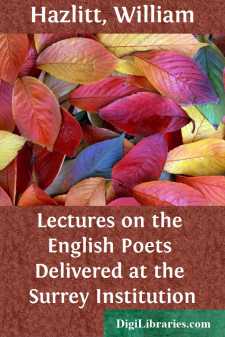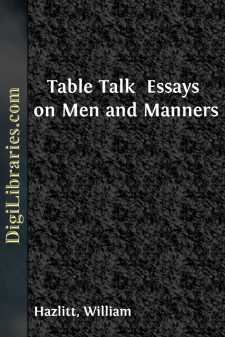Categories
- Antiques & Collectibles 13
- Architecture 36
- Art 48
- Bibles 22
- Biography & Autobiography 815
- Body, Mind & Spirit 144
- Business & Economics 28
- Children's Books 18
- Children's Fiction 14
- Computers 4
- Cooking 94
- Crafts & Hobbies 4
- Drama 346
- Education 58
- Family & Relationships 59
- Fiction 11833
- Games 19
- Gardening 17
- Health & Fitness 34
- History 1378
- House & Home 1
- Humor 147
- Juvenile Fiction 1873
- Juvenile Nonfiction 202
- Language Arts & Disciplines 89
- Law 16
- Literary Collections 686
- Literary Criticism 179
- Mathematics 13
- Medical 41
- Music 40
- Nature 179
- Non-Classifiable 1768
- Performing Arts 7
- Periodicals 1453
- Philosophy 65
- Photography 2
- Poetry 896
- Political Science 203
- Psychology 44
- Reference 154
- Religion 515
- Science 126
- Self-Help 85
- Social Science 82
- Sports & Recreation 34
- Study Aids 3
- Technology & Engineering 59
- Transportation 23
- Travel 463
- True Crime 29
William Hazlitt
William Hazlitt (1778–1830) was a prominent English essayist, critic, and social commentator known for his sharp intellect and eloquent prose. He is best remembered for his essays on literature, art, and philosophy, which explored human nature and the complexities of emotion. Hazlitt was a passionate advocate of Romanticism and a contemporary of writers like Samuel Taylor Coleridge and Charles Lamb. His works, such as "The Spirit of the Age" and "Table-Talk," are celebrated for their insightful analysis and vivid expression of ideas.
Author's Books:
Sort by:
by:
William Hazlitt
THE PICTURE H. Oh! is it you? I had something to shew you—I have got a picture here. Do you know any one it's like? S. No, Sir. H. Don't you think it like yourself? S. No: it's much handsomer than I can pretend to be. H. That's because you don't see yourself with the same eyes that others do. I don't think it handsomer, and the expression is hardly so fine as yours...
more...
by:
William Hazlitt
JEREMY BENTHAM. Mr. Bentham is one of those persons who verify the old adage, that "A prophet has no honour, except out of his own country." His reputation lies at the circumference; and the lights of his understanding are reflected, with increasing lustre, on the other side of the globe. His name is little known in England, better in Europe, best of all in the plains of Chili and the mines of...
more...
by:
William Hazlitt
LECTURE I.—INTRODUCTORY ON POETRY IN GENERAL. The best general notion which I can give of poetry is, that it is the natural impression of any object or event, by its vividness exciting an involuntary movement of imagination and passion, and producing, by sympathy, a certain modulation of the voice, or sounds, expressing it. In treating of poetry, I shall speak first of the subject-matter of it, next...
more...
by:
William Hazlitt
The book here included among The World's Classics made its first appearance as an octavo volume of xxiv + 352 pages, with the title- page: Characters of Shakespeare's Plays, By William Hazlitt. London:Printed by C. H. Reynell, 21 Piccadilly, 1817. William Hazlitt (1778-1830) came of an Irish Protestant stock, and of a branch of it transplanted in the reign of George I from the county of...
more...
by:
William Hazlitt
ESSAY I. ON THE PLEASURE OF PAINTING 'There is a pleasure in painting which none but painters know.' In writing, you have to contend with the world; in painting, you have only to carry on a friendly strife with Nature. You sit down to your task, and are happy. From the moment that you take up the pencil, and look Nature in the face, you are at peace with your own heart. No angry passions rise...
more...






